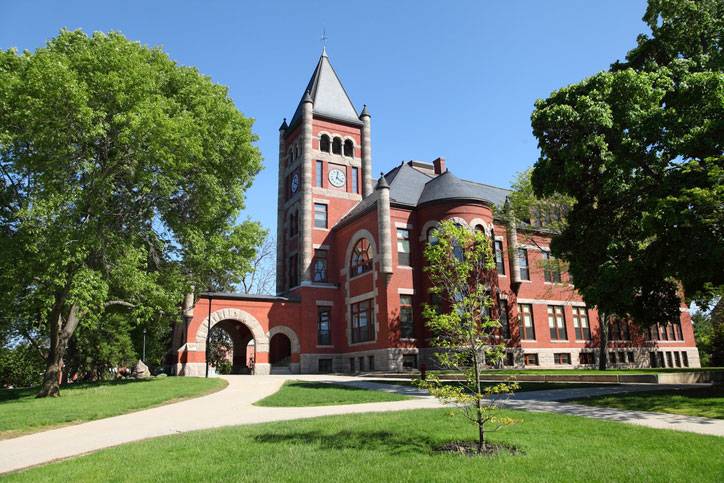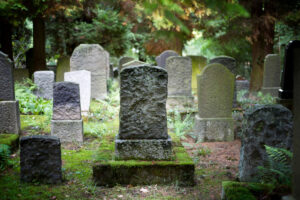Created by CreativeWritingEDU.org Contributor

There’s something in the air in New Hampshire that makes for good writing. Maybe it’s those New England autumns where quiet, winding roads cut through brilliant foliage and warm cider fills the air. Maybe it’s the centuries-old seaport towns like Portsmouth where remnants of the American Revolution inspire images of the American dream. Or maybe it’s the idyllic landscape, framed by the snow-capped Appalachian range, that slowly unfolds as you wind your way through the Kancamagus Highway.
The Granite State is home to the likes of Jodi Picoult, Dan Brown and John Irving – arguably some of the biggest names in contemporary literature. But it’s also where some of America’s literary giants like J.D. Salinger and Robert Frost wrote the creative works that inspired a nation and shaped the literary world. Frost wrote some of his most beloved poems and books of poetry while on the Frost Farm in Derry, undoubtedly moved by the beauty that surrounded him. “Whose woods these are I think I know/His house is in the village though/He will not see me stopping here/To watch his woods fill up with snow” (Stopping by Woods on a Snowy Evening).
Okay, so you’ve got yourself big shoes to fill. But the cool thing about the creative writing field is that it’s never saturated, and there’s always a spot for an emerging voice with something interesting to say. From Nashua to Concord to Lincoln, New Hampshire is rich not only in inspiration, but in exciting opportunities to begin exploring your creative voice.
And when you’re ready to make a name for yourself and begin transforming your love of the written word into a lifelong career that pays the bills, it’s time to get the education that you’ll need – a traditional bachelor’s or master’s degree in creative writing, or a fine arts degree, namely the BFA (Bachelor of Fine Arts) or MFA (Master of Fine Arts) in Creative Writing.
New Hampshire: A Sanctuary for the Creative Writer and Poet
 New Hampshire loves its creative past, so it’s little wonder that many bibliophiles make their way here every year to visit some of the sites where their favorite poet or author sought respite and inspiration. There’s just something beguiling about stepping back into time and imagining the spot where J.D. Salinger was inspired to put pen to paper or where E.E. Cummings refined his unique, free-form poetic style.
New Hampshire loves its creative past, so it’s little wonder that many bibliophiles make their way here every year to visit some of the sites where their favorite poet or author sought respite and inspiration. There’s just something beguiling about stepping back into time and imagining the spot where J.D. Salinger was inspired to put pen to paper or where E.E. Cummings refined his unique, free-form poetic style.
Robert Frost – If you’re a lover of Robert Frost’s poetry, there’s not one, but two places that have kept his past alive here – the Frost Place in Franconia and the Frost Farm in Derry. While the Frost Place is often associated with a lull in his work, the Frost Farm is largely associated with a prolific period of his life. He once wrote to a friend, “To a large extent, the terrain of my poetry is the Derry landscape, the Derry farm…There was something about the experience at Derry which stayed in my mind and was tapped for poetry in the years that came after.”
J.D. Salinger – The author famously fled the intense, frenetic NYC scene in 1953 after receiving literary acclaim for his most famous work, Catcher in the Rye, and moved to a ramshackle barn in Cornish, complete with no running water and no bathroom. But what this property lacked it made up for in tranquility, solitude, and a view that fueled his creativity for the better part of his adult life. It was here that he wrote Franny, Raise High the Roof Beam, Carpenters, and several others. He spent the next sixty years on his property in Cornish (in two separate cottages) until his death at age 91.
Grace Metalious – Her most famous work, Peyton Place, a rather scandalous novel that quickly became one of the most best-selling works in publishing history, was written in Manchester though inspired by Gilmanton, where she was raised. Her grave in Gilmanton is visited regularly by curious lovers of her famous work who often leave coins and flowers on top of her white marble headstone.
E.E. Cummings – This famed poet’s New Hampshire summer retreat, Joy Farm in Madison (Silver Lake), is a National Historic Landmark. This home, best described as a modest, Cape Cod-style home with weather-beaten clapboard siding, is exactly what you would imagine a poet’s refuge to be – quiet, solitary, and nestled in a whisper-quiet meadow. It’s also where he created many of his most famous works. Today, it frequently serves as a writer’s retreat, and the Joy Farm Writer’s Retreat hand selects a distinguished group of writers-in-residences to host them.
Creative Writing Classes, Courses, and Workshops in New Hampshire Can Prepare You for a Creative Writing Degree
As anyone who’s dabbled in the creative writing field will tell you, there’s no holy grail waiting to be discovered. In other words, there’s no one formula that you’ll follow to hone your craft. Instead, it’s a process that starts with putting in the time and writing, writing, writing. It’s about exploring what works, and certainly what doesn’t. It’s also about discovery – learning and being inspired by others and settling into, and getting comfortable with, the literary scene and your local writing community. After all, great writers aren’t born overnight.
Welcoming both aspiring and published writers, the New Hampshire’s Writing Project is a great nonprofit arts organization in Manchester that’s home to a nice variety of events throughout the year, including its own conference. Some of the popular events they host include a Writer’s Night Out, which is like a meet-and-great for writers to discuss what they’re working on, and the Three-Minute Fiction Slam, a fast-paced literary competition that challenges writers to write a literary piece in three minutes or less in front a panel of judges. You don’t have to be a member, but doing so gets you free admission to most events and an invitation to their annual conference.
The Poetry Society of New Hampshire in Amherst should be on your radar if poetry is your genre. Members of the society (it’s just $25 for the year to join!) enjoy access to a nice array of events throughout the year. Participate in an open mic night; listen to published poets talk about their creative process and recite their work; and meet and talk to the poets of The Poets Touchstone journal.
Exeter LitFest is an annual literary fest that brings together aspiring and published authors in one, dynamic occasion. Last year’s festival brought big names in publishing, poetry, and literature over the course of the weekend. They also work with handful of local restaurants to provide unique literary menus and promotions to keep the party going after the day’s events end (translation: your opportunity to hobnob with well-known artists and maybe even buy them a drink).
And between events and other social gatherings, there’s plenty to keep you learning and growing as a writer. Check out the literary magazine Barnstorm, sponsored by the University of New Hampshire MFA program. It doesn’t cost a dime to submit your work to them, and their blogs are always chocked full of good advice. Franklin Pierce University’s student-run literary journal, Northern New England Review, is another great spot to read good stories and submit your own. They always welcome submissions from aspiring writers from New Hampshire, Maine, and Vermont.
Writing Colleges in New Hampshire Offering Bachelor’s and Master’s Degrees in Creative Writing Provide a Path to Becoming a Writer
Creative writing is a pastime many of us enjoy, but if you want to graduate beyond the occasional open-mic night or literary festival, you’re always best served with a formal degree in your back pocket. Simply put, there’s no substitute for the education and practical training that a bachelor’s or master’s degree can offer, particularly a BFA or MFA in Creative Writing. A degree is an inevitable steppingstone if you’re serious about moving beyond amateur endeavors and into the big league.
Are there exceptions to every rule, and will you come across the writer who’s made it without an education? Perhaps. But the formal training of a BFA or MFA comes complete with unmatched guidance and mentorship from an experienced faculty of published writers and visiting writers; superb opportunities to work with student-led publications and get your feet wet through an internship; and exciting opportunities to move beyond your comfort zone and explore a variety of genres, themes, topics, and more.
Best of all, whether you want an on-campus or online academic experience, there’s a great (and growing) selection of colleges and universities in New Hampshire and beyond that are home to undergraduate and graduate creative writing programs.
Bachelor of Fine Arts (BFA) and Other Bachelor’s Degrees in Creative Writing in New Hampshire
Colby-Sawyer College
SCHOOL OF ARTS AND SCIENCES
Accreditation: NECHE
Degree: Bachelor – BA
Private School

- Creative and Professional Writing
Dartmouth College
FACULTY OF ARTS AND SCIENCES
Accreditation: NECHE
Degree: Bachelor – BA
Private School

- English-Creative Writing concentration
New England College
Accreditation: NECHE
Degree: Bachelor – BA
Private School

- Creative Writing
Southern New Hampshire University
Accreditation: NECHE
Degree: Bachelor – BA
Private School

- Creative Writing and English (Fiction, Nonfiction, Poetry, Screenwriting)
University of New Hampshire-Main Campus
COLLEGE OF LIBERAL ARTS
Accreditation: NECHE
Degree: Bachelor – BA
Public School

- English-Writing focus
Master of Fine Arts (MFA) and Other Master’s Degrees in Creative Writing in New Hampshire
New England College
Accreditation: NECHE
Degree: Master – MFA
Private School

- Creative Writing (Fiction, Non-Fiction, Poetry, Writing for Stage and Screen, Dual Genre)
Southern New Hampshire University
COLLEGE OF ARTS AND SCIENCES
Accreditation: NECHE
Degree: Master – MFA, MA
Private School

- MFA - Creative Writing
- MA - Creative Writing (Fiction, Nonfiction, Poetry, Screenwriting)
University of New Hampshire-Main Campus
COLLEGE OF LIBERAL ARTS
Accreditation: NECHE
Degree: Master – MFA
Public School

- Writing (Fiction, Narrative Nonfiction, Poetry)




